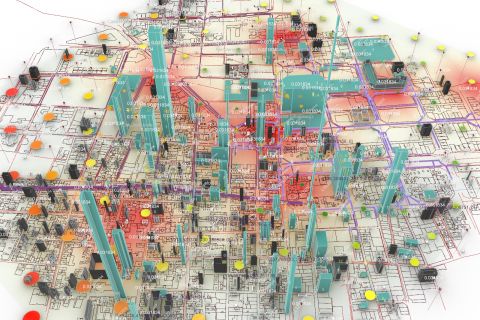Research & Innovation Authority
רשות המחקר והחדשנות
مكتب الأبحاث والابتكار
The 212 Lab is Bezalel's Innovation and Entrepreneurship Lab, which aims to create Design Driven Ventures and develops expertise in two main areas: Healthcare and Environmental Impact. In both of these areas, the lab seeks to develop meaningful solutions to universal challenges.
The lab operates through four coordinated, complementing circuits:
The developmental-entrepreneurial circuit is constructed of interdisciplinary student teams of all departments developing a project under the guidance of the lab’s team. Utilizing the lab's unique methodology, the young entrepreneurs identify a universal challenge, explore the solutions spectrum, develop a proof of concept (POC), test it, and then proceed to build a viable business strategy as well as the venture’s story. Beyond the creation of significant and applicable solutions, this process provides students with a unique entrepreneurial toolbox that reflects the value of Design and creative professionals in reality-changing endeavors.
Content development and culture creation. The lab generates quality content and forms it into distributable knowledge within the applied innovation and entrepreneurship realm. The lab produces lecture series, events, competitions and community-oriented projects to encourage and facilitate awareness and participation within the Bezalel community and help in establishing an entrepreneurial culture.
Research and Methodology. The lab engages in a continuous and consistent effort to develop and articulate its unique Design-Driven Venturing (DDV) methodology. As part of this effort the lab performs intental studies (on different scales) that investigate trends, perceptions and positions with regard to design, innovation and entrepreneurship. The lab diligently documents its processes in order to construct a solid model for thinking and operation.
Strategic partnerships and special projects. The 212 Lab, both in its R&D and an Innovation generator capacity, is growing its network of strategic partners and collaborators. The Lab has signed several agreements with prominent partners within the medical, biotechnological and financial sectors. It is engaged in several research and venturing efforts with industry and academic partners.
Lab 212 Lab was envisaged and set up due to Bezalel Acadeny’s win of a competitive grant put forth by the Council of Higher Education, for the establishment of an innovation and entrepreneurship academic center. The winning proposal was submitted jointly with the Hebrew University and Azrieli College of Engineering. The three institutions make up the JLM IMPACT Consortium - the Jerusalem Association for Innovation and Entrepreneurship.
The design and architecture graduates have always worked within the health system, but in recent years, they have integrated more and more as a crucial and important part of the system – as solution, technology and medical equipment developers. They lead improvement processes and are responsible for both the caretakers and patients’ satisfaction. Significant examples of this can be found in major, important medical centers in the U.S. and Europe such as the Mayo Clinic, Kaiser Permanente and the Jefferson Medical Canter in Philadelphia.
The work the designers and architects is essential and spearheading, raising the patients’ awareness and understanding of the medical processes they undergo, and that of the medical system as far as the necessary steps it must take to become more efficient and stronger in its performance, for the benefit of those who need its services.
At this time, when the health system is coping with fast-pace, major change and adaptation challenges, and countless urgent problems that have far-reaching implications on the public’s health, exacerbated by the COVID-19 pandemic, the importance of innovat8ion, change, improved processes and the ability to come up with quick solutions are made possible with the different thinking process designers bring with them.
The Florence Project – ‘Bezalel in Sorokoa’
The Florence Project is a unique project introducing students from all academic departments in their last semesters of school, with real challenges faced by the health system. In an extraordinary collaboration between the Soroka Medical Center staff headed by CEO Yarden Nevo, his Deputy Ella Amoyal and Deputy Nursing Director Hagit Hadad, a design studio has opened inside the hospital premises, in which processes will be examined, needs will be identified and solutions will be developed for hospital comers.
As part of the project, some ten outstanding undergraduate and graduate students moved to Beer Sheba for one semester, where they work and study at the interdisciplinary design and innovation center established within the Soroka Medical Center campus. The project is founded on observing the individual within the system and creating innovative solutions that focus on the patient, his family members and medical staff and proposes humane solutions that mediate between new technologies and those using them.
During that period, participants will execute a complete R & D process for a service or product at the medical center. They will learn methodologies of design thinking and design for service, from the research stage up until the prototype stage, using them to develop solutions to urgent problems in Soroka and in the healthcare system, during the COVID-19 pandemic. The program participants will work in groups teamed up to the various medical center departments, working in full collaboration with all interested parties – patients and their families, physicians and medical staff, research professionals and more.
The program will combine diverse content studied in academia – design thinking, design or service, product and spatial design, user experience, animation, visual communication and more. Aside from professional and academic tools, the program participants will also acquire teamwork skills, coping with real challenges, meeting deadlines and preparing for the work force. The students will be supervised by academic lecturers and other lecturers from different disciplines along with key figures from Soroka Medical Center.
The program’s products, which will be based on real challenges and problems faced by the medical center, and demonstrated to the group by the medical staff, will reach the preliminary assimilation stage at the medical center at the least. In addition, the program will demonstrate a new and innovative approach to learning – through practical practice, in diverse groups and while comping with real challenges. LIVING LAB -
The project is led by:
Michal Eitan – former head of the M.A. program in Industrial Design at Bezalel, and a current senior lecturer in the program. In recent years, Michal has been working on managing transformation processes in the healthcare system. She is a former COO of Check Point, and is amongst its founders, as well as working as a Deputy CEO of a business incubator, and more.
Maya Atshtein – industrial designer, graduate of the M.A. program in Design and Technology at Bezalel. Graduate of Bezalel and the Joint’s internship program and a design for service specialist.



